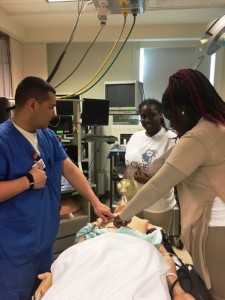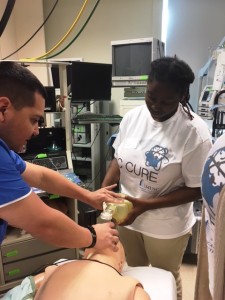Burke HS Students Benefit from MUSC Grant to Increase Underrepresented Students in Medical Professions
Photo above: SC CURE scholars are presented with certificates at the End of Term Ceremony at Burke High School for completion of Part I of the SC CURE Spring course, which focused on Cancer Biology and Cancer Epidemiology.
Dr. Marvella Ford and Dr. Dennis Watson, and their team at the Medical University of South Carolina Hollings Cancer Center, have been working hard on an important project in direct benefit to students interested in medical careers in Dr. Michael Goler’s Health Science program at Burke High School.
The project is called: South Carolina Continuing Umbrella of Research Experience (SC CURE) Program for Underrepresented High School Students

SC CURE scholar Ms. Christen (Samone) Carter learns clinical skills in the MUSC Simulation Lab during the SC CURE “A Day in the Life of a Medical Student’ event, co- sponsored by the MUSC College of Medicine.
Dr. Ford provided the following original plan for the deployment of the SC CURE program, and the selection of the scholars that would participate, in cooperation with many stakeholders – thankfully the student have completed the first year, and the second year of the program is presently progressing as planned in cooperation with Dr. Goler and others in the Burke HS faculty.
THE PLAN BELOW IS NOW IN YEAR TWO!
Aim 1. Deliver an annual 18-week cancer-focused course at Burke High School taught by MUSC-HCC scientists. Part I, Year 1 of the course will focus on general principles related to cancer biology and epidemiology. Part II, Year 2 will focus on cancer disparities and the social and biological contributors to these disparities as well as the research underway to address them.
- Part I/Year 1 of the course will begin in January 2017 and will cover general cancer biology and epidemiology principles building and applying the Scholars’ knowledge from their basic biology and/or chemistry course experience at Burke High School.
- Part I of the course will be developed during the Fall of 2016 by Dr. Watson working with MUSC-HCC faculty as well as with Burke High School science teachers. This will be essential to ensure South Carolina educational core competencies are met by the course.
- Part II/Year 2 of the course will begin in January 2018 with a focus on cancer disparities and the social and biological contributors to these disparities as well as the research underway to address them.

SC CURE scholar Ms. Raven Rivers learns clinical skills in the MUSC Simulation Lab during the SC CURE “A Day in the Life of a Medical Student” event, co-sponsored by the MUSC College of Medicine Dean’s Office.
Part II of the course will be developed by Dr. Ford and MUSC-HCC faculty and will be a modification of an existing Cancer Health Equity Research Course that has been developed for the NCI R25E targeted for undergraduate students.
- Scholars participating in these 18-week/two semester courses will receive didactic instruction at Burke High School, ninety minutes per day, from MUSC-HCC cancer researchers, who collectively will present interdisciplinary perspectives on state-of-the-art cancer science.
- The course will include quizzes, examinations, oral presentations, group laboratory projects, and a capstone paper each semester.
- Each Scholar will receive at least 15 MUSC college credits for successfully completing both courses.
Aim 2. Conduct a seven-week, hands-on research project experience in an MUSC-HCC laboratory or research setting during two consecutive summers.
- Twenty rising sophomores and juniors from Burke High School will be competitively selected to participate in the seven-week SC CURE summer research experience which will take place over two consecutive summers.
- The purpose of the SC CURE summer research component is two-fold:
1) to expose and inform SC CURE Scholars about the many career options in biomedical sciences and the education paths to realizing these careers; and
2) to convey MUSC-HCC’s commitment to apply science/research to address cancer and cancer disparities in the state.
- The purpose of the SC CURE summer research component is two-fold:
Aim 3. Offer enrichment activities throughout the two-year SC CURE Program tailored to stimulate the interest of Burke High School students in pursuing a biomedical research career.
- Spring Break – Year 01 (Day in the Life). During spring break, the SC CURE Scholars will spend one day touring the MUSC hospital and research facilities and meeting with underrepresented graduate students from MUSC’s Colleges of Medicine, Nursing, Dental, Health Professions, Pharmacy, and Cancer Biology/Graduate programs. Topics of discussion will include a day-in-the-life of an MUSC student, steps to take in high school and college, the college and medical/graduate school application process, etc.
- The SC CURE Scholars will be divided into small groups of five and given the opportunity to spend an afternoon meeting with MUSC-HCC faculty scientists (physician scientists, population scientists, or laboratory scientists) in their laboratories or research settings with the goal of identifying their mentors for the summer research experience.
- Examples of small-group experiences might include:
- 1) meeting with an MD/PhD radiation oncologist and touring the state-of-the-art radiation therapy facilities where he treats lung and GI cancer patients and then visiting his laboratory where he is conducting research on the impact of smoking on cancer treatment outcomes;
- 2) visiting the MUSC-HCC Genomics Shared Resource to observe researchers performing genomic profiles of patients and then meeting with a multidisciplinary faculty team that includes a bioinformatics specialist, laboratory researcher, and clinician to learn how these genomic profiles are driving the delivery of personalized medicine; and 3) meeting a biochemist who is working on the development of a new compound discovered in the Antarctic Ocean for the treatment of cancer using animal models and advanced imaging technology.
- Cultural Enrichment Activity. As part of SC CURE program, each Scholar will also participate in a cultural enrichment experience at the Penn Center in historic Beaufort, SC, a Sea Island community. During the Scholars’ spring break in Year 2, Dr. Ford will coordinate this field trip, paid for by MUSC-HCC, and she will moderate a health-related dialogue between the students and residents of this Sea Island community. The mission of the Penn Center is to promote and preserve the history and culture of the Sea Islands.
Initial Program Participants
- Sophomore and junior-level Burke High School Students
- To apply, students must demonstrate an interest in pursuing a biomedical science career and have a minimum 2.5 grade point average.
- The SC CURE student application will include:
- 1) a brief written statement expressing their interests in biomedical research and/or cancer research;
- 2) two letters of recommendation from teachers at Burke High School with at least one from a science course teacher; and
- 3) copy of previous semester report card.
- Ford and Watson and the Principal will assess each applicant based on these materials to determine the top candidates, including a wait list in the case of dropouts. If an additional level of review is required, SC CURE Program leaders will conduct interviews to make the final selections.
- Based on this process, a cohort of 20 Scholars will be chosen to participate in the two-year SC CURE Program. It is expected that selected Scholars will commit to the entire two years. In the case of a dropout, students from the wait list will be invited to join the Program.


